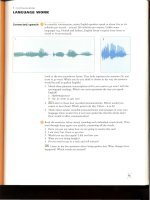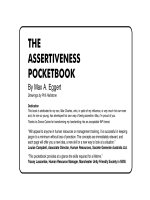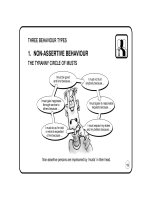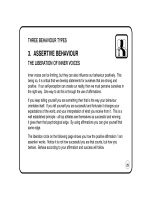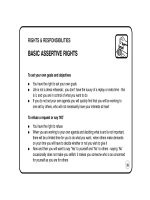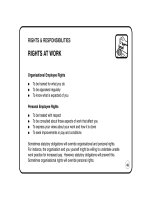THE ASSERTIVENESS POCKET BOOK phần 3 ppsx
Bạn đang xem bản rút gọn của tài liệu. Xem và tải ngay bản đầy đủ của tài liệu tại đây (133.08 KB, 10 trang )
I must gain happiness
through service to
others because
I must be good
and kind because
I must not hurt
anybody because
I must agree to reasonable
requests because
I must respect my elders
and my betters because
I must do as I'm told
or what is expected
of me because
THREE BEHAVIOUR TYPES
1. NON-ASSERTIVE BEHAVIOUR
THE TYRANNY CIRCLE OF MUSTS
Non-assertive persons are imprisoned by ‘musts’ in their head.
19
THREE BEHAVIOUR TYPES
1. NON-ASSERTIVE BEHAVIOUR
THE PRISON BARS OF INAPPROPRIATE OBLIGATION
Freedom and assertiveness are about choosing the rules you wish to live by.
20
NEGATIVE THOUGHTS
ABOUT SELF
ACTUAL
PERSONAL
FAILURE
LOW SELF-
ESTEEM
EXPECTATIONS
TO FAIL
HIGH SELF-
ESTEEM
POSITIVE THOUGHTS
ABOUT SELF
EXPECTATIONS
TO SUCCEED
ACTUAL
PERSONAL
SUCCESS
THREE BEHAVIOUR TYPES
1. NON-ASSERTIVE BEHAVIOUR
SELF TALK: FAILURE AND SUCCESS CIRCLES
21
“If you think
you can or you think you can’t
you’re right”
Henry Ford
THREE BEHAVIOUR TYPES
1. NON-ASSERTIVE BEHAVIOUR
THE TYRANNY OF INNER VOICES
Sometimes the way we talk to ourselves works against us. We all have voices in our
heads that monitor what we do and how we behave. Sometimes the voices are our own;
sometimes they are voices of people significant in our past: parents or teachers, in fact
anyone in our childhood who was emotionally significant. Sometimes the voices are
helpful, sometimes not. Whilst it may be difficult to stop the voices, even when you know
it is your mother speaking, you can decide whether or not to be influenced. Here are
some of the more inappropriate voices:
● Don’t make a fuss
● Always respect your elders and betters
● You must always work hard
● Real men don’t cry
● A good woman is always patient
● All’s well that ends well
● Don’t bring your problems home
● You must work harder
22
● Life is not supposed to be fun
● Be good
● Children should be seen and not heard
● Don’t interrupt
● Grin and bear it
● Be perfect
● Finish what you start
THREE BEHAVIOUR TYPES
1. NON-ASSERTIVE BEHAVIOUR
THE TYRANNY OF INNER VOICES
When we first came into the world, we had no difficulty making our needs felt. We were
also exceptionally flexible, doing whatever it took to get fed, or get attention.
It was only later that we lost our spontaneity and internalised
the ‘shoulds’ and ‘oughts’ of others.
To be assertive is to recognise that
sometimes the inner voice is useful,
and at other times it is restrictive
and inappropriate. By all means
listen to the inner voice, but do
not allow yourself to be ruled
by it at all times.
23
THREE BEHAVIOUR TYPES
2. AGGRESSIVE BEHAVIOUR
The aggressive person:
● Frequently argues with others
● Frequently gets angry and thinks that others need to be put in
their place
● Has no difficulty in complaining when receiving poor quality
products or services
● Usually gets own way in situations
● Expects others to accommodate own time schedules
● Has strong views on many subjects and has no
difficulty in expressing them
● Easily and frequently finds fault with others
● Continually works to personal agendas at the
expense of others
● Rarely feels aware of the needs or feelings of others
● Competes with others and is angry if not successful
24
THREE BEHAVIOUR TYPES
2. AGGRESSIVE BEHAVIOUR
AGGRESSION
Aggressive individuals are essentially selfish. They know what they want and like, and
disregard the needs of others in satisfying their own needs.
Aggressive people think of themselves as superior beings. They think they are OK and
the rest of the world is not. They voice their opinions and needs, and behave as if others
do not matter.
The origin for aggressive behaviour is complex. Perhaps as small children aggressive
people discovered they could get what they wanted, and subsequently developed
behaviour around this inappropriate, albeit successful, behaviour. Sometimes aggressive
behaviour is an over-correction of being too passive, or it could be an inappropriate way
of dealing with anger.
25
THREE BEHAVIOUR TYPES
3. ASSERTIVE BEHAVIOUR
The assertive person:
● Is able to express desires and feelings to others
● Is able to converse and work well with people at all levels
● Is able to appreciate the views of others and accept any that appear
more reasonable than their own
● Is able to disagree with someone yet retain their friendship and respect
● Is aware of the needs and desires of others
● Is able to make concessions to others without feelings of inadequacy
● Is able to express a concern or a need with minimum
embarrassment to both parties
● Is able to control feelings and emotions even in difficult or
emotionally charged situations
● Is able to refuse a request without feeling guilty or obliged
● Is able to ask for what he or she wants and can insist on
legal entitlements without becoming emotional
26
THREE BEHAVIOUR TYPES
3. ASSERTIVE BEHAVIOUR
DOUBLE ADVANTAGE
27
DISADVANTAGES
Low self-
esteem
You don’t state
your views
Feelings of
anxiety
You get put
upon
DISADVANTAGES
You get
isolated
You are not
popular
You hurt
others
You take
advantage
ADVANTAGES
You don’t always
have to win
You fit in
easily
You don’t
feel guilty
You don’t
upset people
ADVANTAGES
High self-
esteem
You get what
you want
You express
your needs
People don’t
take advantage
NON-ASSERTIVE
AGGRESSIVE
THE BENEFITS OF BEING ASSERTIVE
Assertiveness enjoys the advantages of non-assertion and aggressiveness
and has none of the disadvantages of either.
THREE BEHAVIOUR TYPES
3. ASSERTIVE BEHAVIOUR
PSYCHOLOGICAL ADVANTAGES
● You can put limits on your own behaviour and that of others
● You can enjoy a realistic outlook on what is
possible for you and what is not
● You are not adversely affected by
rude or impolite people
● You are able to rejoice at your successes
and accept your failings
● You can always be in control of your own
behaviour and not be pushed into a rage
or forced into submission
28


